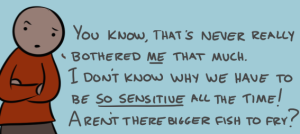Them: No dogs.
Me: But—
Them: No dogs.
Me: But he’s not a—
Them: No dogs.
Me: But my partner needs—
Them: No dogs.
Me: ghfdadfkjdkjfakdja
Them: kjdfakdjfaldjflgjanodogs
Sigh. Ableism.
My partner, his service dog, and I almost became homeless this past summer due to conversations such as this.
Landlords and realtors wanted nothing to do with us – even the ones who openly claimed to welcome dogs on their premises.
Which is totally illegal given that The Fair Housing Act permits disabled people and their service animals to live in places that do not allow pets – without any extra fees or consequences.
Take our old place, for example. Sure, we already had a home, but it’s kind of hard to hold onto the place when your landlord sells to a dickhead.
The new landlord didn’t even bring up the possibility of us staying. When we approached this person, their response was pretty much a flat, “No dogs.”
No amount of logic or compromise would sway the new landlord. No up in rent, no offer of pet insurance (though that’s illegal to require of or accept from people with service dogs), no meeting of gentle Doggie, no touring of the apartment to show how neat and damage-free it’d been kept during our time there, no enthusiastic vouching by the landlord who’d known us for years.
Nope. No dogs.
So out we went into the world.
For those of you whose lives involve certain dis-abilities and/or a service animal, you probably already know what the world had in store for us. But for those of you who are blissfully unaware, I’m more than happy to clue you in.
First off, what you need to know is this: Doggie is certified in his high level of training, safety, and docile temperament, thereby ruling out any and all concerns the common landlord would have for a dog being on their property.
Second, it is illegal and oppressive to discriminate against service dogs – no matter what.
Third, what my partner and I experienced is a type of violence that people with dis-abilities experience all the time.
And now that you know that, you can know all of the joys that come with searching for housing while you’re a dis-abled family with a service dog.
1. Ableism Doesn’t Save Space for Discrimination Against Other Identities
That’s not at all to say that other identities don’t deal with hardcore housing discrimination of their own, but in the case of my partner and I, we couldn’t even work past the dis-ability thing in order to be discriminated for other reasons.
Case in point: We’re both trans, but we never got far enough in any of the rental processes to even be outed by the government on that one.
What a weird thing to complain about, right?
We were never discriminated against for being a trans couple because everybody was just that focused on discriminating against my partner’s dis-abilities.
But really, when it comes to squeaky-clean apartment tenancy, my partner and I are the tropiest tropes that ever troped.
We’re clean, we’re quiet, we pay the rent on time, I’m white and my partner’s white-appearing, we have great references and decent credit, blah blah blah.
Even our male-male couple status is considered beneficial to property values where we live.
We come off about as non-threatening, responsible, and polite as white property owners love to see. We give them warm fuzzies of baby duckling joy.
We’re just…a dis-abled family. And that was reason enough to cast us out.
But rest assured that if my partner and I had any other sort of visible marginalized identity, this article wouldn’t exist.
Especially by the methods we eventually used, we wouldn’t just be homeless right now. We’d be in jail.
2. You’re More Likely to Experience Rejection from Housing Gatekeepers
In case you didn’t know, discrimination in all of its forms is still incredibly rampant in the United States. (And if you didn’t know, what freaking la-la land do you live in?)
I’m not exaggerating when I say we went through hundreds of listings, dozens of landlords, and several realtors meant to represent us.
All of them rejected us for the same exact reason: despite being dog-friendly, they didn’t want a service dog on their premises (or represent somebody with a service dog).
When we’d prompt them as to why, they’d respond with reasons that ironically paired up with why some landlords don’t want dogs on their premises to begin with: damaged doorframes, feces in the yard, young children living on one of the other floors.
No amount of Doggie paperwork or reciting of basic ADA or Fair Housing Law would budge them. Nor would the enticements of extra rent, extended leases, or pet insurance.
We’d frequently be at the top of a landlord’s list of tenant picks, but as soon as we explained about Doggie, we’d be denied.
On several occasions, we were given the surprisingly direct response of, “That’s a shame. You were my top choice, too,” or “You would’ve gotten this place if it weren’t for that.”
Or rather, we’d have gotten our pick of any of the sweetest spots if we weren’t a dis-abled couple.
It’s a situation we’ll never understand: If somebody was so willing to advertise themselves as accepting of dogs as pets, why wouldn’t they accept one as a service animal?
And then there were the sneaky, more passive folk.
The ones that wouldn’t return our calls or emails, the ones that magically couldn’t remember who we were a single day after we interviewed with them, the ones that suddenly decided they didn’t want a dog on the premises after all, so they were “going with the one candidate who didn’t have one.” (Plot twist: They had three.)
Other places said that, oh golly, the place had already been rented…only for us to later find out that these places were still on the market, our acquaintances getting to tour them with the suddenly oh-so-cordial landlords in question.
We tried all sorts of tactics, one of them to hide the fact that Doggie was a service animal at all, instead pretending he was a pet.
We again were shot down either by the landlord’s insurance or their general fears: Doggie is one of the many breeds on the banned/restricted breeds list.
Breeding bullshit and irresponsible owner handling aside, to have housing people adhere so strictly to such lists is a devastating blow for people with the common breeds of service dog.
If my partner and I showed the paperwork that proved Doggie was harmless, we were denied the rental space just as equally because now they didn’t want us for ableist reasons.
We were fucked.
3. You’re More Likely to Experience Ridicule and Humiliation from Housing Gatekeepers
There were a select few times my partner was chewed out mercilessly by realtors when they found out he was dis-abled. And I mean mercilessly. I’m talking name-calling, finger-pointing, laughing-out-loud atrocities of human compassion.
And yet we both would continue to sit there. Because we thought maybe, just maybe, these people would take pity on us and finally help us out once they had their fill of putting my partner down.
If they called my partner shit and we both agreed, perhaps that’d start some kind of macabre, desperately needed camaraderie.
This shouldn’t have been a reason for me. To this day, I’m ashamed that I didn’t leap over a desk and legit strangle someone. Like really.
4. It Puts a Strain on Relationships and Mental Health
“Strain” is far too mild of a word.
When we returned from a particularly bad session of ridicule, my partner had what he later referred to as a complete breakdown. Shaking, hyperventilating…hopefully you’re not familiar.
It was all I could do to get him to the bed and hold him until he got the worst of the hurt out of his system.
I know this article isn’t about just me, but I need to say this anyway:
There’s nothing, absolutely nothing, more painful than seeing the person you love most in the world being ripped apart from the inside-out and knowing you’re completely helpless to make it better.
After his self-identified breakdown, my partner had a talk with me that same night. In short, our little adventure was turning into a last-minute Lifetime script: He wanted me to ditch him. That way, even though he – as a survivor of homelessness – would be back out on the street, I’d at least be spared.
I refused. This is how stubborn assholes love.
5. You’re More Likely to Consider Giving Up Your Service Animal
Since it looked like Doggie might be fucked no matter what, my partner then began to talk out another alternative: giving him up.
Before I could even respond, he knew this was just as implausible as anything else, since Doggie was essential to his health.
Not only would it have been bad for my partner to go without him, it’d have been made exponentially so by the irony of my partner being the one to have “made the choice” to give him up.
Further, there was no guarantee oh-so-dangerous-breed Doggie would’ve found a home. Knowing the chance he could be put down tore my partner up even more.
6. Your Quality of Life Is More Likely to Plummet
We were at least eight weeks into our search by this point and were bone tired. Searching for a home with no car while working full-time (and then some) kind of sucks enough on its own.
But after the day of my partner’s self-identified breakdown, we pulled out all of the stops.
I canceled all of my freelance and writing gigs literally overnight while my partner cut back his own work schedule. (Ironically dangerous, since less income = less desirability as tenants.)
We began to hunt for apartments in shifts; when one of us couldn’t keep his eyes open anymore, the other would take over. All hours of the night, during lunch breaks, everything and anything.
As a result, his dis-abilities worsened, and my anorexia and suicidal thoughts returned. I’d fall asleep on the bus to work and my partner would miss his stop entirely because he couldn’t remember where he was or where he was going.
We both fielded so many calls during work hours that we risked losing our jobs, all the while suffering from a dangerous lack of sleep, sudden anxiety attacks, and an overall feeling of complete and utter hopelessness.
And we still got nowhere.
Soon enough, we had only two weeks left.
7. You Run a High Risk of Becoming Homeless
Have you ever wondered why so many homeless individuals seem to have some level of dis-ability? From missing limbs to war scars to talking to oneself, it’s no coincidence that these two identities have collided so hard.
Between the ongoing lack of proper and accessible healthcare in this country and our quiet insistence to discriminate in all marketable ways of living, people who are dis-abled have frighteningly limited options for keeping themselves safe and healthy.
The result? Falling really fucking hard really fucking fast.
Sometimes all it takes is a handful of people in power who don’t like your face, to simply say “no.” That one syllable repeated over and over nearly destroyed my family.
I’m not sure what’s more terrifying: How easy it is to discriminate or how devastating the results can be. But rest assured there are no protected classes.
8. You Get Snuffed by Johnny Law
“But, but, but…there are laws in place to keep this stuff from happening!”
Aww. You’re cute.
Look, laws are nice and all, but they don’t do shit without the right people backing them up.
I repeat: Laws are useless if there’s nobody around to uphold them.
And even if that were in place, all of these micro-illegalities still run rampant and unchecked because, quite frankly, laws don’t get people to change their minds about who they want to hate on.
While laws are important to have in place, we need to give equal (if not more) focus and effort toward the education of equality for the everyday person.
As one of the nightmare realtors said more than once, unprovoked, between breaths of ridiculing my partner, “What’re you going to do? Sue us? Sue the landlord? That stuff takes a long time. You still won’t get the apartment.”
And we knew even then that they were absolutely right. We were boned.
9. There’s Even Less Help for the Aftermath
When our time ran out, we pulled our last card.
Hearing about a place where the landlord lived nowhere near and was, shall we say, lazy, we took a massive chance and kind of…let ourselves on in.
We got the keys from the former tenant (bless their heart), moved all of our shit in, set up camp, and simply started throwing money at the landlord. It was basically squatting while still paying rent.
We were on shaky ground for a couple of months, but the landlord either realized Doggie was awesome or decided we weren’t worth the effort of taking legal action. We’ve since signed an official lease for the year.
In short, sometimes you have to break the law to have any chance at security, safety, or equality.
But just because our problem was “solved” doesn’t mean all of the residual damage magically disappeared.
My partner and I lost six months from our lives with this bullshit, not including the stress, mental anguish, and resulting physical issues we’ve both endured because of it. We’re still both working toward putting our lives back together.
My partner has had to return to therapy after two years of feeling he didn’t need it anymore. I’ve lost virtually all of my writing gigs.
He’s been working on bringing down the spike in his PTSD and physical ailments, and I’ve had to once again relearn how to eat. We’re simply not the same people we were before this happened.
And believe us when we say we’re going to be paranoid as fuck come next summer.
[do_widget id=’text-101′]
James St. James is a Contributing Writer for Everyday Feminism. He works as a transcriber for super-duper secret projects, tends to keep to himself, and is currently pitching a novel that scares agents. He uses his experiences as a way to reach out to others, usually by way of not keeping his mouth shut. When he’s not busy making cis gender people uncomfortable with his trans gender agenda, he likes to play vintage video games and eat candy. You can praise him on Twitter @JamesStJamesVI. Read his articles here.
Search our 3000+ articles!
Read our articles about:
Our online racial justice training
Used by hundreds of universities, non-profits, and businesses.
Click to learn more





















